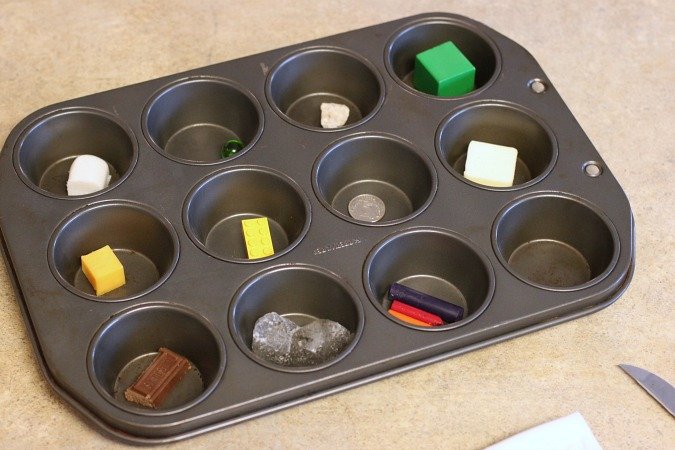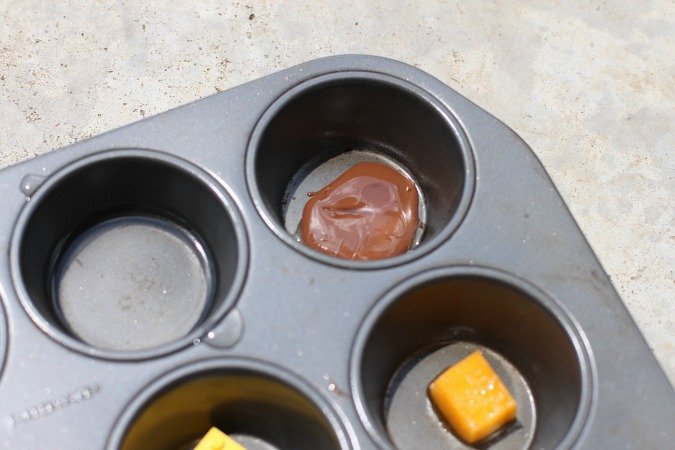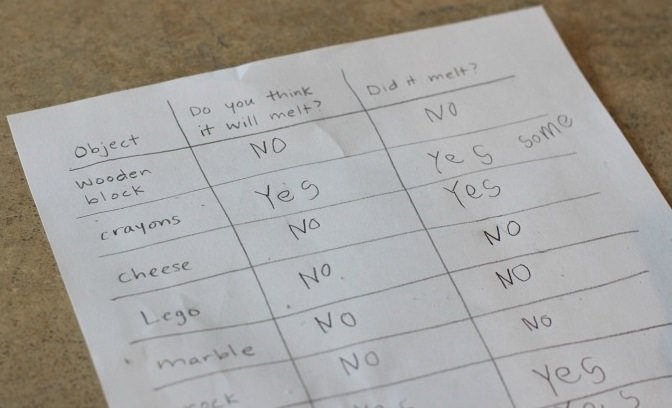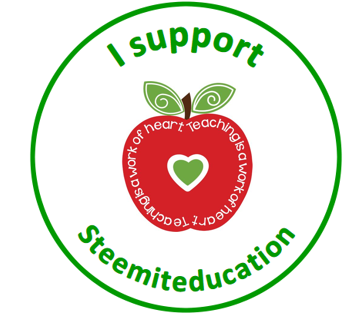While it’s winter here in South Africa, our days are still filled with warm sunshine and as a family we often find ourselves outdoors soaking up the rays and “thawing” our bodies. One such sunny afternoon I decided to re-do an activity I had done with my son as a toddler. I thought that since he’s slightly older now that he might learn more from the experiment and enjoy it in a different light – no pun intended!
For this little bit of science, you simply need to raid your home our school store room for some kitchen aids and a variety of small objects and food stuffs. For your kids to get a real feel for the experiment, you will want to make sure that you collect a variety of things which are in different solid states, that is; some that will melt in the sun, some that will partially melt and some that won’t melt at all but will simply remain warm to the touch.

WHAT MELTS IN THE SUN?
For this experiment you will need to gather the following apparatus:
- A muffin tin (you could use a normal tray, but it’s nice that the muffin holders contain the substances that do melt).
- Items that will melt in the sun (like ice cubs, jelly, butter, chocolate etc.)
- Items that will partially melt in the sun (like crayons and candles)
- Items that won’t melt (think Lego blocks, small rubber balls, marbles etc.)
Preparation:
- Add your variety of small items to your muffin tin, placing one item in each muffin holder.
- Make sure the sun is shining (the hotter the day the better) and place your muffin tin outdoors in direct sunlight.
- Have a discussion with the kids and ask them to tell you which items they think will melt and which ones won’t. If you are working with older kids, you can ask them to write out their predications, capture the results and come up with hypotheses regarding their observations. With very little kids, simply point out the substances that are melting, let them feel the items as they melt and let them compare it to the items that remain in a solid state.


Source link: https://frugalfun4boys.com/2015/06/11/simple-science-experiment-for-kids-what-melts-in-the-sun/
This experiment is safe to do and is suitable for parents to administer at home with their kids, or teachers could do it as a visual demonstration to accompany some more in-depth theory. Our little ones are never too young to be introduced to science and my kid always revels in wonder and excitement when we “play” with science. As simply as an activity like this is, it has the opportunity to feed curious minds. Science activities encourage problem solving, logic and even creativity! What fun!
THE SCIENCE BIT
All solids have a melting point – not just water! The melting point of water is 32 degrees Fahrenheit, but other substances have different melting points. The melting point of butter is 90 degrees F, so if it’s below 90 degrees it’s technically frozen – even though it is not cold to the touch. Another example – the freezing point of Jello is 50 degrees Fahrenheit, so if it’s warmer than 50 degrees it will melt. The quarter in our tray did not melt because we were nowhere near its melting point of 1,981 degrees F (a quarter is primarily copper). - https://frugalfun4boys.com/2015/06/11/simple-science-experiment-for-kids-what-melts-in-the-sun/
Time to clean up!
Finish the experiment off with some added fun by allowing the kids to scoop up and eat the melted treats i.e. Marshmallows, chocolate, fudge, toffees. This can be a fun experiment from start to finish and can pass a good couple of hours of the day. Enjoy it with little ones young and old!
Much love - @sweetpea


You have been upvoted by the @sndbox-alpha! Our curation team is currently formed by @jeffbernst, @bitrocker2020, @zord189, @aaronleang, @jrswab & @teachblogger . We are seeking posts of the highest quality and we deem your endeavour as one of them. If you want to get to know more, feel free to check our blog.
Thank you as always :)
A good experiment with the foodie for childrens
@sweetpea
Look at my stuff too if u have spare time
Thanks :)
As always: Very creative thinking on how to explain melting on kids.
But is toddlers maybe too early? What age would you be thinking in? I would be thinking around 6 years old or so
It is such a versatile activity, toddlers would simply enjoy feeling the warmth and playing around with the melted items (more sensory play), older kids will be in awe of what they are witnessing and even older kids can take the experiment to an advanced theoretical level :) Thank you so much for you support @karinxxl
STOPAnother fun experiment for the science kids!
I am sure they had a blast doing this one as well!
Thanks for sharing these ideas!
Only my pleasure! And this nifty activity is always a hit :)
Great article.The best moments are usually associated with those spent with family. I hope to do this someday with my kids. Resteemed.
Thank you for your support @broel. I completely agree with you, family time is the best!
This is a perfect teaching activity for out of classroom learning. Kids can be tasked with bringing (or finding on the school grounds) a variety of items for this experiment, and when they're involved they learn better! Thank you for sharing!
Only my pleasure! Yup, you can make this experiment as easy or as complex as you like. Sending the kids out to "hunt" for their items is an excellent idea!
Thanks, this is a great experiment for the children. I will try it out in the summer here in the northern hemisphere.
I hope you enjoy it and delight in the results!
This is such a cool concept! I wonder if you could spice it up with a magnifying glass :p
Oooh that would be fun yes, speed up the process a bit! That way the kids could also be more active during the experiment, instead of just waiting around to let the sun do its thing! Thanks for that awesome idea!